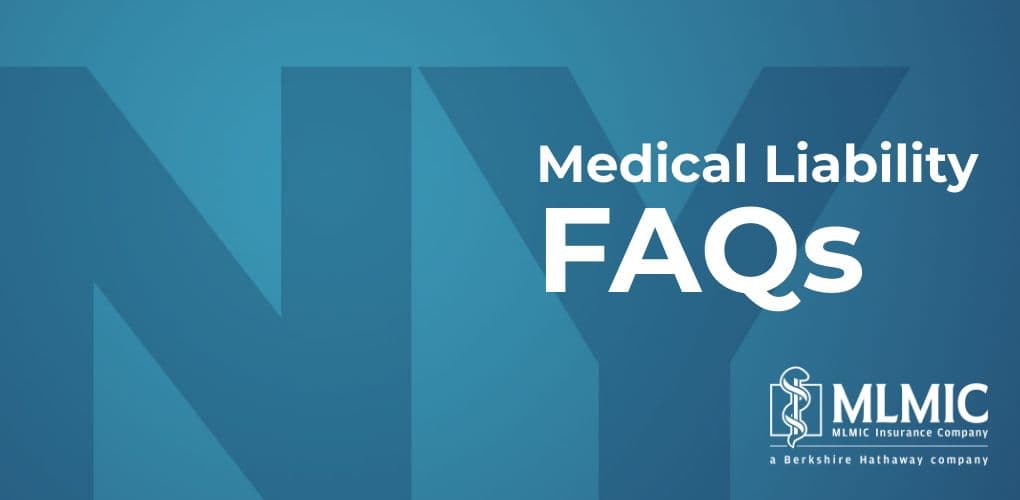< Back to Publications & Resources
Attorneys Respond to Medical Professional Liability FAQs on Retention and Release of Medical Records

During the course of a year, the attorneys at Fager Amsler Keller & Schoppmann, LLP, counsel to MLMIC Insurance Company, handle approximately 5,000 questions from policyholders on professional liability, risk management and healthcare law. Frequently, the questions asked by healthcare professionals involve requests for legal guidance on retention and release of medical records.
Here, we’ve paired the FAQs on medical professional liability related to retention and release of medical records with the attorneys’ responses.
How long must physicians retain medical records?
- Medical records of non-obstetrical adult patients and mammograms should be retained for 10 years from the date of submission of the last claim for payment.
- Records of minors, that is persons under the age of 18, must be retained for at least 10 years from the date of submission of the last claim for payment, or when the minor reaches the age of 20-1/2, whichever is longer.
- Medical records of obstetrical patients must be retained for the same period as minors. If the birth was viable, but the child did not survive, the records must be retained for 10 years from the date of submission of the last claim for payment.
These time periods are recommended in view of state and federal statutes and regulations, pertaining to malpractice and healthcare offenses.
What documents do I need to release medical records to someone other than a patient?
You must have an authorization or release form signed by the patient or by an individual legally authorized to request healthcare information. The authorization must be dated and must designate the name of the party who is releasing the record and to whom the records are to be released. A release that states “to bearer” is not acceptable. The authorization or release form must state the reason for the authorization (“at my request” is sufficient) and must specify the medical information to be released (e.g., “all my records”). Each authorization form must contain an expiration date or event.
In addition, the Health Insurance Portability and Accountability Act (HIPAA) requires that certain statements be included in each authorization form. Thus, you must ensure that the authorization form is HIPAA compliant and that it contains all of the required elements. Although notarization is not mandated by law, you may as a policy decision require that the signature on the authorization be notarized.
We recommend comparing the patient’s signature on the release form to his/her signature in the chart. If the patient is not the person who signed the authorization, then a copy of a legal document permitting the designee to sign the authorization must be also obtained. These may include, for example, healthcare proxy documents or court papers appointing the person as the administrator or executor of a deceased patient’s estate. In unusual circumstances, such as those concerning custody or divorce, patient incompetence, or death, you should contact your attorney to discuss how to proceed.
What type of information requires specific or special authorizations to release the medical record?
Any medical records containing HIV-related information, the records from an alcohol or drug treatment program, and/or psychiatric or mental health facility records require a specific and special authorization. The New York State Department of Health HIPAA compliant HIV authorization is available on the DOH website. Psychotherapy notes that receive heightened protection are defined by HIPAA as notes recorded by a mental health professional documenting or analyzing the contents of a conversation during a counseling session. They are particularly protected under HIPAA only if maintained separately from the record.
Release without authorization is limited to situations defined under the law, i.e. patient treatment by the originator of the notes, for mental health training in programs at the covered entity and for defense by the covered entity in a legal proceeding brought by the individual, government investigations or lawful activities by a medical examiner.
Patients are not entitled to access to psychotherapy notes and may be denied the opportunity for review of this decision. Notes not deemed to be psychotherapy notes include medical prescriptions and monitoring, session times, modalities and frequency of treatment, summaries of diagnosis, functional status, treatment plan, symptoms, prognosis and progress to date. However, if a physician merely writes a note in the office record about the patient’s history of mental illness, the use of psychotropic medications or the addiction to or abuse of alcohol or illegal drugs, a special consent to release records is not required.
The attorneys of Fager Amsler Keller & Schoppmann, LLP (FAKS) perform thousands of hours of professional liability services per year. They are uniquely qualified to assess medical-legal issues and provide counsel to minimize liability exposure. MLMIC policyholders can reach 24/7 legal support services by calling (855) FAKS-LAW or emailing hotline@FAKSLAW.com. For more information about these services, offered exclusively to MLMIC policyholders, visit our web page on Legal 24/7.



